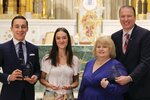
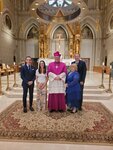
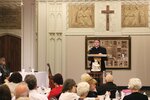
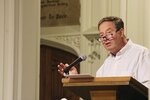
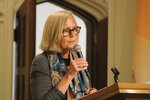
PROVIDENCE — “Standing up for life, I realize that the environment in which we do so has grown ever more contentious. But I think sometimes, strangely, that may be a sign of hope,” Bishop Richard G. Henning said at the opening of Human Life Guild Day on Oct. 28.
“As the pro-abortion side grows more desperate, they get louder and, it seems, more violent. But that may be, in fact, a sign that the message of the pro-life movement over so many years is, in fact, getting through,” the bishop continued, going on to suggest that the faithful should “seed this society with a renewed reverence for the beauty, the gift, the sanctity of all human life.”
At the start of the Mass Bishop Henning thanked Lisa Cooley, the coordinator of the Office for Life and Family Ministry, which organizes the annual event, along with members of the Human Life Guild, for their tireless efforts in raising awareness for the pro-life movement.
Four local Catholics were honored with the Human Life Guild Award for their unconditional commitment to and defense of human life at every stage, in every condition, through thought, word, deed and prayer.
Awards were given to both adults and youth for their support of pro-life issues.
The adult awardees were David Mitchel and his wife Laurie, parishioners of St. Rocco’s Parish in Johnston. David and Laurie serve as volunteers at the Little Flower Home and have organized many events and help to coordinate among various pro-life organizations.
Joshua Kline and Riley Morin, both parishioners of St. Philip Parish in Greenville, received the youth awards.
Morin, a senior at Ponagansett High School in North Scituate, volunteers with several pro-life organizations and participates in the March for Life.
Kline, a junior at Bishop Hendricken High School, in Warwick, is the president of the Pro-Life Club at his school. He has organized many pro-life events and is deeply involved with pro-life organizations at St. Philip Parish.
“It almost seems unreal,” Morin said on being honored.
Her message to supporters of the pro-life movement was simple: “Don’t stop fighting for the truth.”
Kline expressed similar sentiments, seeing events like Human Life Guild Day as “a sign that we need to continue our prayers for the promotion of life and the sanctity of human life from conception until natural death.”
Vicar General and Moderator of the Curia Msgr. Albert A. Kenney celebrated the Mass, joined by many other priests.
Father Ryan Connors, S.T.D., professor of moral theology and Dean of Men at St. John’s Seminary in Brighton, Massachusetts, offered the homily.
Mass was followed by a series of talks held in the cathedral hall centering on a philosophical, medical and spiritual analysis of the debates surrounding transgenderism.
Father Connors asserted that the Catholic view on the human person can shed light on the nature of gender.
“Man is created body and soul,” he said. “The human person does not so much have a body as much as he is a body-soul composite. God didn’t make a mistake when he created man.”
“Political and social movements cannot supply the foundation for a correct conception of human dignity and human destiny,” Father Connors continued.
Deacon Timothy Flanigan, M.D., an infectious disease specialist and professor at Brown Medical School, spoke of the psychological and sociological implications of transgenderism.
Deacon Flanigan noted that body dysmorphia often brings with it a vast array of psychological struggles, and that being honest about the realities of body dysmorphia places a strain on one’s relationships with their family and friends.
Deacon Flanigan continued by pointing towards statistics showing that those who undergo sex-reassignment surgery exhibit no more progress in dealing with their underlying psychological struggles than those who do not undergo such procedures.
He stated that it is easy to hide the struggles surrounding body dysmorphia and transgenderism.
“I would venture to say that this is a specialty in America: looking just fine, but not being fine on the inside,” Deacon Flanigan noted.
The solution he suggested is for family and friends of people suffering from these issues to express a sense of love towards them, and to create a context within which people can be honest about and openly work through the psychological struggles they face.
The third speaker, Dr. Sheila Kuzmic, a Rhode Island-born Catholic writer, public speaker and retired pediatrician, suggested that the conversations surrounding transgenderism be situated within the context of the larger battle between good and evil.
“The Church is being attacked. The domestic Church is under attack. So really, when we talk about this delicate topic of transgenderism, we have to realize that we are in a battle between good and evil,” Kuzmic said.
Kuzmic’s talk centered on the reality of redemptive suffering, and how those struggling with body dysmorphia, as well as their friends and family, must learn to unite their suffering to that of Christ.
“We’re at war right now, in more ways than one. What is the remedy? What is the weapon? Love. … I’m not talking about sappy love. … This is the kind of love that we have to go through a wine press and be crushed, and come out the other end as nada,” Kuzmic said.
True Christian love requires that we become nothing in the eyes of the world in order to “be everything in Christ.”
“That is the only way we can be transformed in love to fight this battle,” she said.